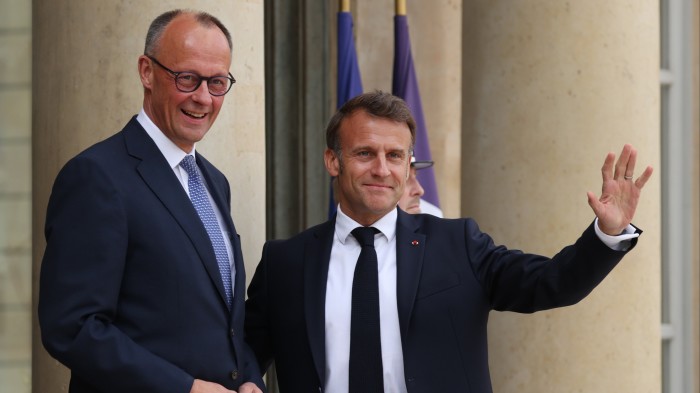Unlock the Editor’s Digest for free
Roula Khalaf, Editor of the FT, selects her favourite stories in this weekly newsletter.
Germany has dropped its long-held opposition to nuclear power, in the first concrete sign of rapprochement with France by Berlin’s new government led by conservative Chancellor Friedrich Merz.
Berlin has signalled to Paris it will no longer block French efforts to ensure nuclear power is treated on par with renewable energy in EU legislation, according to French and German officials.
The move resolves a major dispute between the two countries that has delayed decisions on EU energy policy, including during the crisis that followed Russia’s full-scale invasion of Ukraine.
“The Germans are telling us: we will be very pragmatic on the issue of nuclear power,” said a senior French diplomat involved in the talks. This meant that “all the biases against nuclear power, which still remain here and there in EU legislation, will be removed.”
“This will be a sea-change policy shift,” said a German official.
The reversal comes as Merz is seeking to explore ways for Germany to join France’s nuclear shield as a deterrent against future Russian aggression. “We are now actually finally open to talk to France about nuclear deterrence for Europe. Better late than never,” the German official said.
“It’s a welcome rapprochement that will make the topic of energy easier in the EU,” said Guntram Wolff, senior fellow at think-tank Bruegel. “Politically, Merz is also thinking about the nuclear umbrella.”
Berlin’s reversal on nuclear power is part of efforts by Merz to revive Franco-German co-operation, a precondition for major decisions at EU level that stalled under former chancellor Olaf Scholz.
“When France and Germany agree, it is much easier for Europe to move forward,” said Lars-Hendrik Röller, a professor at Berlin-based ESMT business school who was chief economic adviser to former chancellor Angela Merkel. “While several challenges remain, I believe this issue will be solved.”
Merz, who won elections in February, has been critical of his country’s decision to exit nuclear energy in 2011, under party rival Merkel, which he said was depriving Germany of cheap and reliable electricity.
Merz also criticised his predecessor Scholz for shutting down Germany’s last three nuclear power stations even as the country was grappling with high energy prices. While he does not plan to reopen conventional nuclear power stations, he has vowed to invest in new technologies, including small modular reactors and nuclear fusion, which, unlike fission, produces no long-lived nuclear waste.
The new Franco-German entente on energy builds on a groundswell of enthusiasm for nuclear power since gas prices reached record highs following Moscow’s war in Ukraine.
It leaves Austria as the only EU state strictly opposed to nuclear power. Countries including the Netherlands and Belgium have recommitted to atomic energy, having previously pledged to shut reactors.
In a letter sent to the European Commission on Friday, seen by the Financial Times, ministers from 12 EU member states with nuclear reactors said it was “imperative” that the EU recognised the “complementary nature of nuclear and renewable energy sources”.
They called for an update to an existing survey of the bloc’s nuclear sector to pave the way for governments to give state aid to nuclear projects and send a “clear signal” to businesses and investors about the benefits of atomic power.
Germany, which covered more than 60 per cent of its electricity consumption with renewable energy last year, long opposed Paris’ push to label atomic power as “green”. France derives about 70 per cent of its electricity from atomic power.
Berlin’s concerns in part stemmed from concerns that French industry would gain a competitive edge thanks to its 56-strong fleet of reactors, while German industry still struggles with the impact of high gas prices following the cut-off from cheap Russian fuel.
It has also been an ideological issue in Germany, where the anti-nuclear Green party were a part of Scholz’s government.
The stand-off resulted in long debates over the inclusion of the words “low carbon” — seen as a synonym for nuclear power — across EU legal texts, particularly those relating to renewable power and the production of hydrogen, which Berlin sees as a critical energy carrier for decarbonising German industry.
“To ensure our energy sovereignty while respecting national choices, we are calling for an end to all discrimination at European level against low-carbon energies, whether nuclear or renewable,” said French President Emmanuel Macron during Merz’s trip to Paris on May 7.
For example, Germany’s new stance means that hydrogen produced from nuclear power should now be treated on par with hydrogen made from wind or solar energy, the French official said.
Read the full article here




